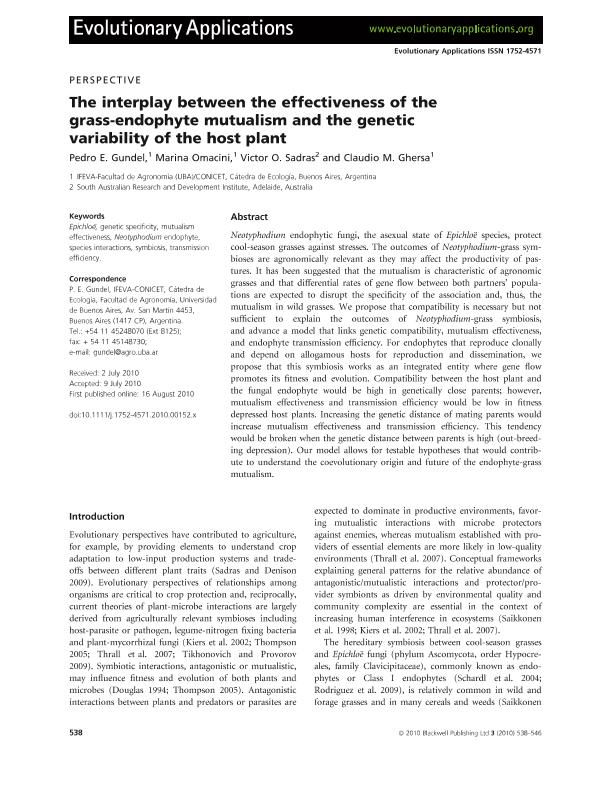Mostrar el registro sencillo del ítem
dc.contributor.author
Gundel, Pedro Emilio

dc.contributor.author
Omacini, Marina

dc.contributor.author
Sadras, Victor Oscar

dc.contributor.author
Ghersa, Claudio Marco

dc.date.available
2019-03-18T20:04:59Z
dc.date.issued
2010-09
dc.identifier.citation
Gundel, Pedro Emilio; Omacini, Marina; Sadras, Victor Oscar; Ghersa, Claudio Marco; The interplay between the effectiveness of the grass-endophyte mutualism and the genetic variability of the host plant; Wiley Blackwell Publishing, Inc; Evolutionary Applications; 3; 5-6; 9-2010; 538-546
dc.identifier.issn
1752-4571
dc.identifier.uri
http://hdl.handle.net/11336/71926
dc.description.abstract
Neotyphodium endophytic fungi, the asexual state of Epichloë species, protect cool-season grasses against stresses. The outcomes of Neotyphodium-grass symbioses are agronomically relevant as they may affect the productivity of pastures. It has been suggested that the mutualism is characteristic of agronomic grasses and that differential rates of gene flow between both partners' populations are expected to disrupt the specificity of the association and, thus, the mutualism in wild grasses. We propose that compatibility is necessary but not sufficient to explain the outcomes of Neotyphodium-grass symbiosis, and advance a model that links genetic compatibility, mutualism effectiveness, and endophyte transmission efficiency. For endophytes that reproduce clonally and depend on allogamous hosts for reproduction and dissemination, we propose that this symbiosis works as an integrated entity where gene flow promotes its fitness and evolution. Compatibility between the host plant and the fungal endophyte would be high in genetically close parents; however, mutualism effectiveness and transmission efficiency would be low in fitness depressed host plants. Increasing the genetic distance of mating parents would increase mutualism effectiveness and transmission efficiency. This tendency would be broken when the genetic distance between parents is high (out-breeding depression). Our model allows for testable hypotheses that would contribute to understand the coevolutionary origin and future of the endophyte-grass mutualism. © 2010 Blackwell Publishing Ltd.
dc.format
application/pdf
dc.language.iso
eng
dc.publisher
Wiley Blackwell Publishing, Inc

dc.rights
info:eu-repo/semantics/openAccess
dc.rights.uri
https://creativecommons.org/licenses/by-nc-sa/2.5/ar/
dc.subject
EpichloË
dc.subject
Genetic Specificity
dc.subject
Mutualism Effectiveness
dc.subject
Neotyphodium Endophyte
dc.subject
Species Interactions
dc.subject
Symbiosis
dc.subject
Transmission Efficiency
dc.subject.classification
Otras Ciencias Biológicas

dc.subject.classification
Ciencias Biológicas

dc.subject.classification
CIENCIAS NATURALES Y EXACTAS

dc.title
The interplay between the effectiveness of the grass-endophyte mutualism and the genetic variability of the host plant
dc.type
info:eu-repo/semantics/article
dc.type
info:ar-repo/semantics/artículo
dc.type
info:eu-repo/semantics/publishedVersion
dc.date.updated
2019-03-08T20:27:39Z
dc.journal.volume
3
dc.journal.number
5-6
dc.journal.pagination
538-546
dc.journal.pais
Reino Unido

dc.journal.ciudad
Oxford
dc.description.fil
Fil: Gundel, Pedro Emilio. Consejo Nacional de Investigaciones Científicas y Técnicas. Oficina de Coordinación Administrativa Parque Centenario. Instituto de Investigaciones Fisiológicas y Ecológicas Vinculadas a la Agricultura. Universidad de Buenos Aires. Facultad de Agronomía; Argentina
dc.description.fil
Fil: Omacini, Marina. Consejo Nacional de Investigaciones Científicas y Técnicas. Oficina de Coordinación Administrativa Parque Centenario. Instituto de Investigaciones Fisiológicas y Ecológicas Vinculadas a la Agricultura. Universidad de Buenos Aires. Facultad de Agronomía; Argentina
dc.description.fil
Fil: Sadras, Victor Oscar. Consejo Nacional de Investigaciones Científicas y Técnicas; Argentina. South Australian Research and Development Institute; Australia
dc.description.fil
Fil: Ghersa, Claudio Marco. Consejo Nacional de Investigaciones Científicas y Técnicas. Oficina de Coordinación Administrativa Parque Centenario. Instituto de Investigaciones Fisiológicas y Ecológicas Vinculadas a la Agricultura. Universidad de Buenos Aires. Facultad de Agronomía; Argentina
dc.journal.title
Evolutionary Applications

dc.relation.alternativeid
info:eu-repo/semantics/altIdentifier/doi/https://dx.doi.org/10.1111/j.1752-4571.2010.00152.x
dc.relation.alternativeid
info:eu-repo/semantics/altIdentifier/url/https://onlinelibrary.wiley.com/doi/full/10.1111/j.1752-4571.2010.00152.x
Archivos asociados
